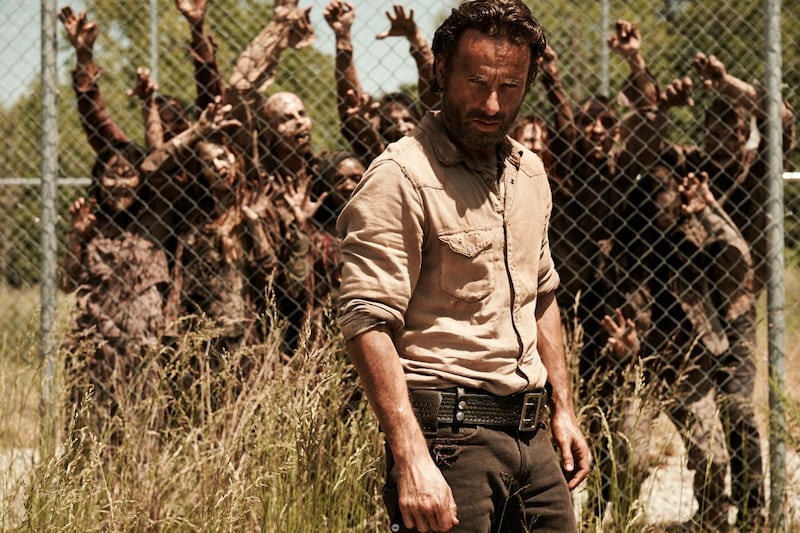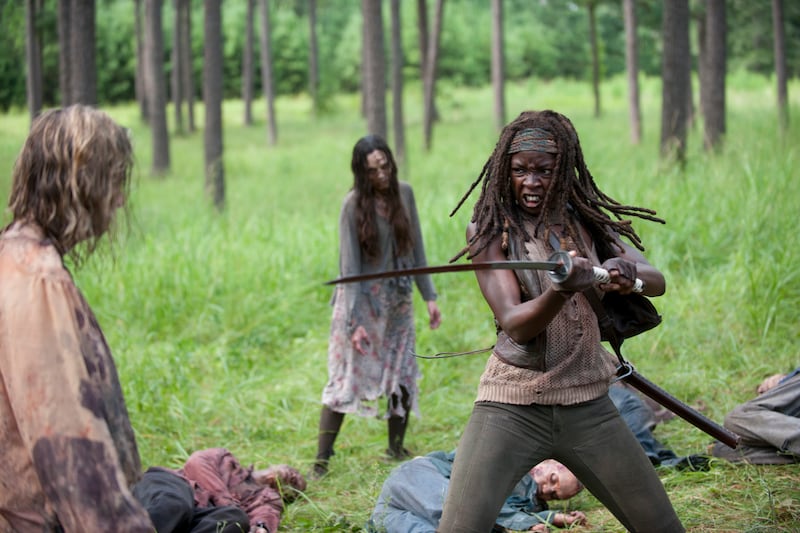Admit it: You’ve always wondered what The Walking Dead would be like without Rick Grimes. In the middle of solving everyone’s problems, or his biweekly speech on What Makes a Good Leader, you secretly thought to yourself, What if—what if—Rick just keeled over dead right now? Would people scream? Would the show go on?

In Sunday night’s midseason premiere, “After,” we at least found out how Carl would deal with the maybe-death of his father. He’d say a lot of mean stuff about him then climb a roof and consume 112 ounces of chocolate pudding.
Indulging in the fantasy of a world without Rick was a pretty self-aware move for The Walking Dead. Variations of the will-he-or-won’t-he-lead-them game have been going on for the past one and half seasons and, as some have pointed out, the show is running out of places to take poor old Rick. His character has been reduced to two basic functions: bravely taking on the burden of leadership, or moping and brooding about how little he wants the role (before putting on his leader hat and doing it all over again).
Of course, it’s a tricky thing to designate one character as “leader” in a high-stakes drama, whether it’s in a world infested by zombies or on a magical island. Lost’s Jack Shephard was another character who suffered from leadership fatigue—but he had daddy issues, romantic woes, rivalries with other characters, and a vivid backstory to spice his storylines up, too. Rick Grimes has got nothing now, apart from his son who hates him half the time. His wife Lori is dead, and Shane, his greatest and most interesting rival, is long gone. Without the Governor, Rick doesn’t even have a real enemy anymore. That is, besides mindless zombies.
In “After,” for the first time the show’s writers seem aware of the Rick problem. When Rick and Carl are on the road together, Rick tries one of his go-to lines: “We’re gonna be okay.” We’ve heard Rick recite these words so many times by now that it’s actually disorienting when he trails off mid-sentence, as Carl shoots him a no-more-bullshit death glare. Throughout the rest of the episode, Rick looks more and more ridiculous, limping and wheezing on the verge of death, yet still barking at Carl for using a gun (“Every bullet counts!”) and bad language (“Watch your mouth!”). At that point Carl and I said in unison: “Are you kidding me?”
So when Rick won’t wake up the next morning, no matter how hard Carl shakes him or how loud he shouts, amidst the surprise and the question running through viewers’ minds (“They wouldn’t really kill off Rick…would they?”) there’s another, definite reaction: This could be good. In a world without Rick, we’re free to delve into other characters’ lives. Flat, undeveloped characters like Maggie and Beth could become real people. Kids like Carl and Lizzie (the girl at the prison who cried when her “favorite walker” was killed), who can barely remember what life was like before the apocalypse, and who have adjusted to their bleak, ugly world better than any adult, could run the show. In Game of Thrones (spoiler alert if you haven’t watched past season one), losing tortured hero-leader Ned Stark made the show that much more exciting. Couldn’t The Walking Dead stand to gain from losing Rick?
Of course, we may never find out. The show backs out at the last minute, Rick wakes up and he and Carl make up. Michonne finds them and the episode has a happy ending. But it’s worth wondering what could have been.
The other main thread of “After” is the long-awaited unveiling of Michonne’s backstory. It comes in the form of a surreal, flashback-like dream and a monologue she has while tracking Rick and Carl. Remember how she cried when she held baby Judith for the first time? It turns out that Michonne once had a child of her own, a little boy around 2, along with a swanky apartment, a handsome boyfriend named Mike, and another good friend, possibly her brother. The dream quickly becomes a nightmare as the conversation turns to a "camp" where people sought refuge at the beginning of the outbreak. Their friend wants to leave, but Mike isn’t willing to risk their lives on the outside. Then he begins questioning the point of going on living at all. Suddenly, Michonne sees Mike and her friend with only bloody stumps for arms.

Later, after seeing a note from a now-dead bar’s owner that reads, “Please do what I couldn’t,” Michonne begins thinking aloud. “I missed you even when I was with you. Back at the camp, that wasn’t you who did it,” she says, addressing Mike. “You were wrong, because I’m still here. And you could be too. And he could be.” To me, this sounds like Mike eventually took his own life and possibly their son’s life, too. And we know that Mike and her friend became the walkers that Michonne once kept in chains. The lady’s had a rough life.
There was no sign of Daryl, Tyreese, Glenn, or any of the other characters this episode—a blessed relief, as using a single episode to check in on everyone in Rick’s now-splintered group sounds like it would only exacerbate the show’s main problem: the underdeveloped quality of many characters. Writer and executive producer Robert Kirkman has said that the show is testing out new episode formats in the back half of season four, including some that will focus on only a few characters at a time, in order to “dive deep into who these characters are and what’s going on with them.” It’s an admirable goal. If the show pulls it off, it won’t even need to kill off Rick.





